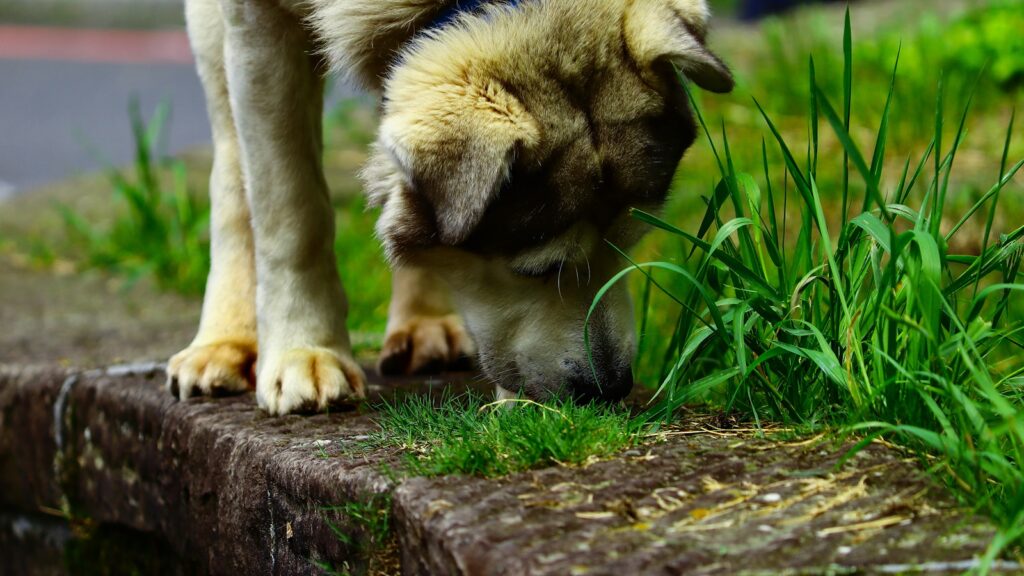Introduction: Unraveling the Mystery Behind Your Pup’s Grass-Chewing Habit
Have you ever noticed your furry friend munching on grass, only to see them vomit shortly after? It’s a common sight that can leave pet owners puzzled and concerned. But fear not, dear readers! In this article, we’ll delve into the intriguing behavior of dogs chewing on grass and explore the reasons behind why they may regurgitate afterward. So, let’s embark on this journey together and uncover the fascinating world of canine behavior!
The Natural Instincts of Dogs: Exploring Canine Behavior
Before we dive into the specific reasons why dogs chew on grass, let’s take a moment to understand their natural instincts. Dogs, as descendants of wolves, have inherited certain behaviors that served their ancestors well in the wild. These behaviors, ingrained in their genetic makeup, continue to manifest in our beloved pets today.
1. Instinctual Behavior
- Dogs have a natural inclination to explore their environment through scent, taste, and texture.
- Chewing is a normal behavior for dogs and serves various purposes, including alleviating boredom, relieving anxiety, and maintaining dental health.
2. Exploration and Foraging
- Dogs are curious creatures by nature and often engage in exploratory behaviors, such as sniffing and tasting different objects.
- In the wild, canines would forage for food, sometimes consuming plant matter along with their prey.
The Grass-Chewing Phenomenon: What Prompts This Behavior?
Now that we have a better understanding of canine instincts, let’s turn our attention to the specific behavior of grass chewing and vomiting in dogs. While there isn’t a single definitive answer, several theories have been proposed to explain this common phenomenon.
1. Dietary Supplement
- One theory suggests that dogs may chew on grass as a way to supplement their diet with nutrients that may be lacking in their regular meals.
- Grass contains fiber and certain nutrients that dogs may instinctively seek out, especially if they have digestive issues or nutritional deficiencies.
2. Digestive Aid
- Another possible explanation is that grass acts as a natural digestive aid for dogs.
- The rough texture of grass can help stimulate the dog’s digestive tract, promoting bowel movements and aiding in the expulsion of indigestible materials.
3. Self-Medication
- Some experts believe that dogs may instinctively eat grass to self-medicate when they are feeling unwell.
- Grass may help induce vomiting, allowing the dog to purge its system of any toxins or irritants that it has ingested.
4. Behavioral Reasons
- In some cases, grass chewing may simply be a behavioral quirk without any underlying medical cause.
- Dogs may engage in this behavior out of boredom, curiosity, or as a form of play.
Addressing Concerns: Is Grass-Chewing Harmful to Dogs?
Now, you might be wondering whether grass-chewing poses any risks to your canine companion. While occasional grass consumption is generally considered harmless, there are some factors to consider to ensure your dog’s well-being.
1. Pesticides and Herbicides
- Avoid letting your dog chew on grass that has been treated with pesticides or herbicides, as these chemicals can be toxic to pets.
- Opt for organic or pesticide-free areas for your dog to roam and explore safely.
2. Foreign Objects
- Keep an eye on your dog while they’re grazing to prevent them from ingesting any foreign objects or toxins that may be present in the grass.
- Monitor your dog’s behavior and contact your veterinarian if you notice any signs of illness or discomfort.
3. Underlying Health Issues
- If your dog frequently vomits after eating grass or exhibits other concerning symptoms, such as lethargy or loss of appetite, it’s essential to consult with a veterinarian.
- Underlying health issues, such as gastrointestinal problems or dietary intolerances, may be contributing to the behavior and require professional attention.
Conclusion: Nurturing Your Canine Companion’s Well-Being
In conclusion, the behavior of dogs chewing on grass and vomiting can be attributed to a combination of instinctual, dietary, and behavioral factors. While it may seem puzzling at first, understanding the underlying reasons can help pet owners better care for their furry friends.
As responsible pet guardians, it’s essential to provide a safe and enriching environment for our canine companions. By being mindful of their behavior and addressing any health concerns promptly, we can ensure that our dogs lead happy, healthy lives.
So, the next time you catch your pup munching on grass, remember that it’s just another fascinating aspect of their natural instincts and behaviors. Embrace the quirks of your furry friend, and continue to nurture the special bond you share!
Frequently Asked Questions (FAQs) About Dogs Chewing on Grass and Vomiting
- Is it normal for dogs to eat grass?
- Yes, it’s relatively normal for dogs to eat grass occasionally. However, frequent or excessive grass consumption may indicate an underlying issue.
- Why do dogs vomit after eating grass?
- There are several theories, including using grass as a dietary supplement, digestive aid, or self-medication to induce vomiting and expel toxins.
- Should I be concerned if my dog vomits after eating grass?
- Occasional vomiting after eating grass may not be cause for concern. However, if it happens frequently or is accompanied by other symptoms, it’s essential to consult with a veterinarian.
- How can I prevent my dog from eating grass treated with chemicals?
- Avoid letting your dog roam in areas that have been treated with pesticides or herbicides. Opt for organic or pesticide-free spaces for safe exploration.
- Are there any health risks associated with dogs eating grass?
- While occasional grass consumption is generally harmless, it’s essential to watch out for potential risks, such as ingesting foreign objects or toxins, and monitor your dog’s overall health and behavior.



